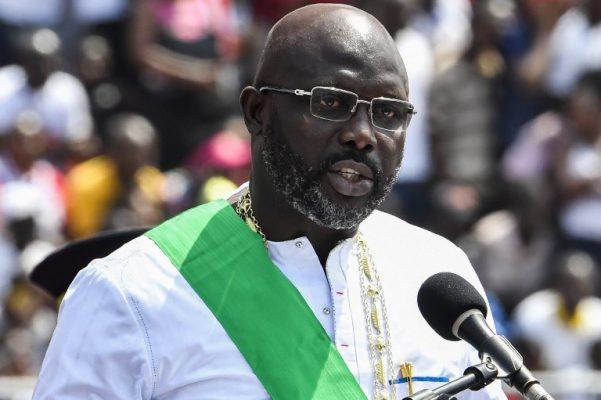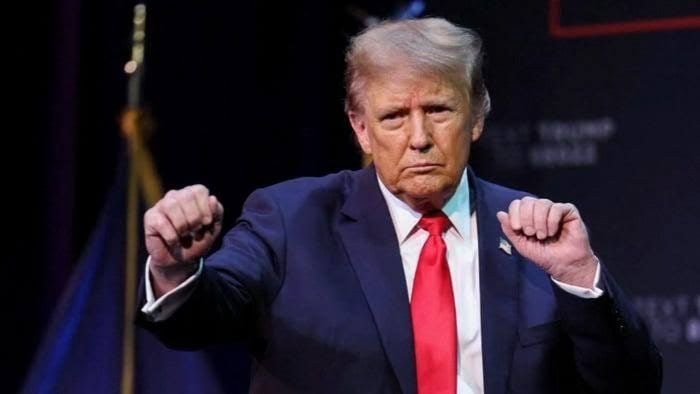Headline
Liberian President Under Heavy Attack For Long Stay Abroad

Liberian President George Weah’s long absence from the country has raised eyebrows and prompted criticism, leading one opposition figure to ask if the West African nation is running on “autopilot.”
Weah went abroad at the end of October for a string of political gatherings in numerous countries– and to watch his footballer son represent the United States at the World Cup in Qatar.
Since then, the President – himself a former football star – has not been seen in his homeland where people are battling soaring prices and shortages of basic goods.
Even those with an understanding of the demands of top-flight diplomacy, or the enduring love of the beautiful game, are beginning to wonder.
READ ALSO: Subsidy: Nigerians Indict NNPC, Accuse Successive Govts Of Complicity
Weah has shared pictures and video of himself with his son in Qatar on Twitter, speaking of being a “proud daddy” as the US national team qualified for the knockout stages.
But images of Weah enjoying himself in the stands in Qatar – where he is a “guest of honour” – while Liberians struggle have not gone down well with many compatriots venting their anger on social media.
“This one here has passed the limit now… who (has) he left us with?” 23-year-old Abraham Kaneh told AFP in the capital Monrovia.
“He’s not going to do the work of the Liberian people. He went to do the work of his own son. He did not go on our plea, he’s gone to see other friends,” said fellow Monrovian Momo Fully.
Well-known media personality Henry Costa joked online that the president would extend his absence to January if his son Timothy scored against England last month.
– ‘Abandoning the entire country’ –
New York-born Timothy Weah is one of many people to hold US and Liberian nationality, with the countries maintaining close ties dating back to Americans’ role in the creation of the West African state in the 19th century.
Plenty of football-loving Liberians follow the younger Weah’s performances for his French club Lille, but for opposition politician Lewis Browne that does not justify the president’s globe-trotting activities.
“Weah continues to insult the intelligence of Liberians and exhibit a high degree of don’t-care attitude by abandoning the entire country and citizens to witness soccer matches,” he said.
Browne also accused Weah of misusing public money to lead a celebrity lifestyle.
The opposition has also condemned what it sees as the president’s gallivanting between Qatar and international summits in Morocco, Egypt, France, Monaco and the United States, with former vice president Joseph Boakai saying Liberia was “on autopilot”.
“We continue to witness other acts of poor leadership, irresponsible behaviour, lack of concern, impunity, and wanton misuse of our finances,” the Unity Party heavyweight added, suggesting others could have represented the country in Weah’s place.
– A ‘necessary’ absence –
Other Liberians defended Weah, who acquired iconic status after becoming the first and only African to win football’s most prestigious individual award, the Ballon d’Or, in 1995.
“I support the president. The man wants to see his son playing, what’s wrong with that?” Alex Bono, 31, told AFP.
Entrepreneur Antoinette Anderson praised Weah for “trying to render services to the Liberian people” and “gather funds out there to make Liberia a better place to live”.
“I don’t have problems with the events he went on. The fact he went there on behalf of the country, I think it’s necessary,” added Tarlue Zeyon in Monrovia.
READ ALSO: Footballers Send Pele Best Wishes Amid Health Concerns
Weah last month extended his stint abroad, the longest since he became president, by another 25 days and is due back in Liberia on December 18.
His government is also facing criticism over its handling of a census that must take place before elections in 2023.
Weah, who came to power in 2017 on a pledge to fight poverty and corruption, has been chosen by his party to seek re-election, but critics say he has failed to honour his commitments.
AFP/PUNCH
Headline
Russia, China Afraid Of US Under My Administration — Trump

United States President, Donald Trump, has said Russia and China fear the United States because of the strength of his administration, arguing that American global influence is driven primarily by its military power and leadership.
Trump, in a post on Truth Social on Wednesday stated that rival powers would not take NATO seriously without the United States, claiming the alliance lacks deterrent force in the absence of American involvement.
He expressed doubts about whether NATO members would come to the aid of the US in a real crisis, despite Washington’s continued commitment to the alliance.
READ ALSO:Trump To Withdraw US From 66 UN, International Organisations
The president credited his leadership with rebuilding the US military during his first term and sustaining its strength, describing this as the key reason adversaries show respect and caution toward the country.
He maintained that America’s military dominance has played a central role in preserving global stability and saving lives.
Trump also argued that his administration forced NATO members to increase defence spending, saying many allies had previously failed to meet financial commitments while relying heavily on the US.
READ ALSO:Insecurity: US Congressman Riley Moore Reveals Trump’s Mission In Nigeria
He added that his actions helped prevent further escalation in Eastern Europe and contributed to the resolution of multiple conflicts.
According to Trump, the United States remains the only nation that commands genuine fear and respect from both Russia and China, a position he attributed to his administration’s approach to defence, diplomacy, and global leadership.
“He wrote partly, “The only Nation that China and Russia fear and respect is the DJT REBUILT U.S.A. MAKE AMERICA GREAT AGAIN!!! President DJT.”
Headline
Trump To Withdraw US From 66 UN, International Organisations

United States President, Donald Trump, has announced plans to withdraw the US from 66 United Nations and international organisations, including key global bodies focused on climate change, peace and democracy.
The decision was disclosed in a presidential memorandum released by the White House on Wednesday evening, following a review of which “organizations, conventions, and treaties are contrary to the interests of the United States.”
According to Trump, the move will see the US end its participation in the affected organisations and cut all related funding.
A list shared by the White House showed that 35 of the organisations are non-UN bodies, including the Intergovernmental Panel on Climate Change (IPCC), the International Institute for Democracy and Electoral Assistance, and the International Union for Conservation of Nature.
READ ALSO:Trump’s Airstrikes: Halt Military Cooperation With US Immediately – Sheikh Gumi Tells Tinubu Govt
Although listed as a non-UN body by the White House, the IPCC is a United Nations organisation that brings together leading scientists to assess climate change evidence and provide periodic reports to guide political leaders.
The memorandum also announced the US withdrawal from 31 UN entities, including the UN Framework Convention on Climate Change (UNFCCC), the UN Democracy Fund, and the UN Population Fund (UNFPA), which focuses on maternal and child health.
Several of the targeted UN bodies are involved in protecting vulnerable groups during armed conflicts, including the UN Office of the Special Representative of the Secretary-General for Children and Armed Conflict.
Reacting to the announcement, UN spokesperson Stephane Dujarric said in a note to correspondents on Wednesday evening that the organisation expected to issue a response by Thursday morning.
Despite repeatedly stating his desire to limit US involvement in UN forums, Trump has continued to exert influence on international decision-making.
READ ALSO:Trump Using FBI To ‘Intimidate’ Congress, US Lawmakers Cry Out
In October last year, he threatened to impose sanctions on diplomats who formally adopted a levy on polluting shipping fuels that had already been agreed to at an earlier meeting, a move that stalled the deal for 12 months.
The Trump administration also sanctioned UN special rapporteur Francesca Albanese after she released a report detailing the role of international and US companies in Israel’s genocidal war on Gaza.
During his first term in 2017, Trump similarly threatened to cut aid to countries that supported a draft UN resolution condemning the US decision to recognise Jerusalem as Israel’s capital.
As a permanent member of the UN Security Council, the US wields significant influence at the United Nations, including veto power, which it has repeatedly used to block efforts to end Israel’s war on Gaza before later mediating a ceasefire.
(Aljazeera)
Headline
UK Supported US Mission To Seize Russian-flagged Oil Tanker – Defense Ministry

The British Ministry of Defence said on Wednesday that it provided support to the United States in its operation to seize a Russian-flagged oil tanker in the North Atlantic.
US seized the tanker, which was being shadowed by a Russian submarine on Wednesday, after pursuing it for more than two weeks across the Atlantic as part of Washington’s efforts to block Venezuelan oil exports.
According to Britain, its armed forces gave pre-planned operational support, including basing following a US request for assistance.
READ ALSO:UK Introduces Powers To Seize Phones, SIM Cards From Illegal Migrants
The UK also said a military vessel provided support for the US forces pursuing the tanker, and the Royal Air Force provided surveillance support from the air.
Defence Secretary John Healey stated that the operation targeted a vessel with a nefarious history linked to Russian and Iranian sanctions evasion networks.
“This action formed part of global efforts to crack down on sanctions busting,” he said in a statement.
READ ALSO:Venezuelan Deportees: US Embassy Gives Reason For Reducing Visa Validity For Nigerians
According to him, the US was Britain’s closest defence and security partner.
“The depth of our defence relationship with the US is an essential part of our security, and today’s seamlessly executed operation shows just how well this works in practice,” he added.
The British government said that the Bella-1 tanker, now renamed Marinera, is sanctioned by the US under its counter-Iran sanctions,
The MoD statement said the support was provided in full compliance with international law.

 News4 days ago
News4 days agoWhat I Saw After A Lady Undressed Herself — Pastor Adeboye

 Headline4 days ago
Headline4 days agoPROPHECY: Primate Ayodele Reveals Trump’s Plot Against Tinubu

 Metro4 days ago
Metro4 days agoArmed Robbers Shot PoS Operator To Death In Edo

 Metro3 days ago
Metro3 days agoAAU Disowns Students Over Protest

 Business3 days ago
Business3 days agoNNPCL Reduces Fuel Price Again

 Metro4 days ago
Metro4 days agoJoint Task Force Kills 23 Bandits Fleeing Kano After Attacks

 Metro3 days ago
Metro3 days agoEdo: Suspected Kidnappers Kill Victim, Hold On To Elder Brother

 Politics4 days ago
Politics4 days ago2027: Rivers APC Pledges To Follow Wike’s Instructions

 Metro3 days ago
Metro3 days agoNine Soldiers Feared Dead In Borno IED Explosion

 Metro4 days ago
Metro4 days agoGunmen Demand N200m Ransom For Kidnapped Brothers In Edo




















